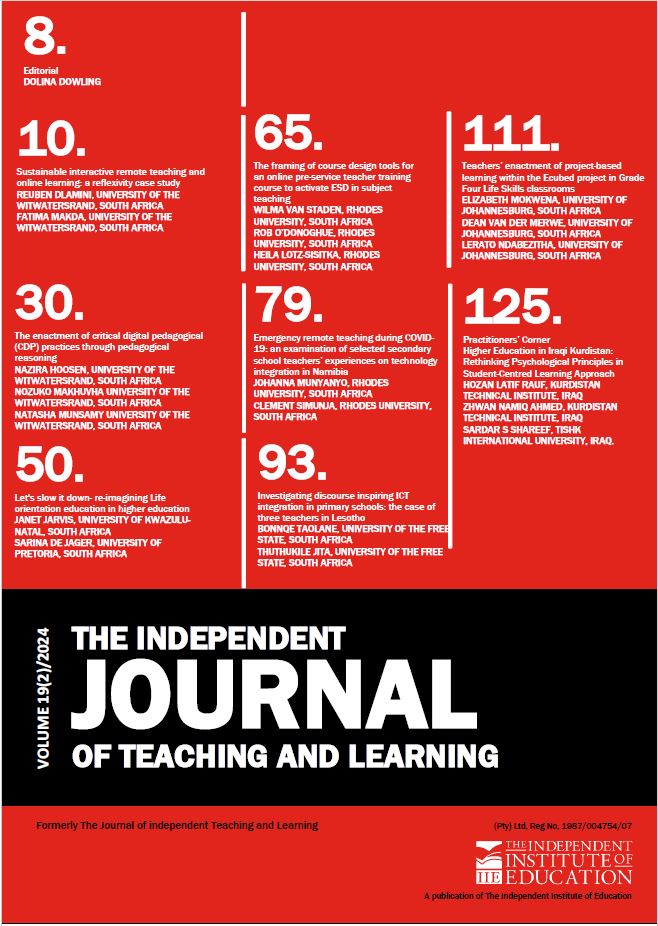The framing of course design tools for an online pre-service teacher training course to activate ESD in subject teaching
DOI:
https://doi.org/10.17159/h1rp0824Keywords:
online learning, curriculum strengthening, course design, indigenous knowledge systems, Education for Sustainable DevelopmentAbstract
AbstractFor the Fundisa for Change initiative that responds to the Department of Basic Education (DBE) curriculum strengthening imperatives, we realised that we needed a curriculum-aligned and course-supported series of subject-based teacher professional development programmes. This paper reports on the design of an online course of co-engaged lesson design research work with teachers that integrates Education for Sustainable Development (ESD), Indigenous Knowledge (IKS) and Sustainable Livelihoods as cross-cutting concerns. The course design was framed as a knowledge-mediated teacher professional development process to strengthen the Curriculum Assessment Policy Statement (CAPS) with curriculum-activated ESD. A Vygotskian action learning schema was used to inform the course, and an associated lesson design research process was designed to mediate and assess ESD lesson planning with teachers. Drawing on these conceptual tools, a 'theory of change' evaluation framework was developed to research and report the course against the Department of Basic Education curriculum strengthening policy and programme.
References
Bosch, C. (2016). Blending with Pedagogical Purpose: A Multi-Perspective Approach.
International Journal of Educational Technology in Higher Education, 13(1), 1-16.
Carter, S. & Gulati, M. 2014. Climate change, the Food Energy Water Nexus and food security in South Africa. Understanding the Food Energy Water Nexus. WWF-SA, South Africa. Retrieved 20 June 2024 from http://awsassets.wwf.org.za/downloads/1 a16231_wwf_climate_change_few_and_food_security_in_sa online.pdf
Department of Basic Education, South Africa. (2020). National Curriculum Statement. Retrieved 11 July 2024 from https://www.education.gov.za/Curriculum/NationalCurric ulumStatementsGradesR-12.aspx
Edwards, A. (2014). Designing tasks which engage learners' knowledge with knowledge. In: I. Thompson (Ed.) Task, Design, Subject Pedagogy and Student Engagement. London: Routledge, pp.13-27. DOI: https://doi.org/10.4324/9781315755434-2
Engeström, Y. (2001). Expansive learning at work: Toward an activity theoretical reconceptualisation. Journal of Education and Work, 14(1), 133-156. DOI: https://doi.org/10.1080/13639080123238
Engeström, Y. & Sannino, A. (2010). Studies of expansive learning: Foundations, findings and future challenges. Educational Research Review, 5(1), 1-24. www.doi:10.1016/j.edurev.2009.12.002 DOI: https://doi.org/10.1016/j.edurev.2009.12.002
Garrison, D. R., Anderson, T. & Archer, W. (2000). Critical Inquiry in a Text-Based Environment: Computer Conferencing in Higher Education. The Internet and Higher Education, 2(2-3), 87- 105. DOI: https://doi.org/10.1016/S1096-7516(00)00016-6
Gogus, A. (2023). Adapting the Activity System Theory Framework for Effective Online Learning.
Journal of Interactive Media in Education, 2023(1), 1-12.
Janse van Rensburg, E. & Lotz-Sisitka, H. (2000) Monograph: Learning for Sustainability. Southern African Journal of Environmental Education, 20, 45-53.
McKernan, J. (2008). Curriculum and Imagination Process Theory, Pedagogy and Action Research. London: Routledge.
National Planning Commission, South Africa. (2012). National Development Plan 2030: Our Future - Make it Work. Pretoria: Sherino Printers.
O'Donoghue, R., Misser, S. & Snow-Macleod, J. (2021). Review of a Course-supported Design Research Intervention Process for the Inclusion of Education for Sustainable Development in School Subject Disciplines. In I. Schudel, Z. Songqwaru, S. Tshiningayamwe & H. Lotz-Sisitka, (Eds.) Teaching and Learning for Change: Education and Sustainability in South Africa. African Minds, 165-182. www.doi:10.47622/9781928502241 DOI: https://doi.org/10.47622/9781928502241_10
Picciano, A. G. (2017). The multimodal model for online education: The role of social presence and interaction in online learning. Journal of Asynchronous Learning Networks, 21(1), 41-49.
Sarabhai, K., Henze, C., O'Donoghuee, R., Sandoval, Rivera, J. C. & Shimray, C. (2022). Handprints for Change: A Teacher Education Handbook. Ahmedabad: Centre for Environmental Education.
Schudel, I. & Lotz-Sisitka, H. (2021). Strengthening Environment and Sustainability Subject Knowledge: Curriculum Challenges and Opportunities. In I. Schudel, Z. Songqwaru, S. Tshiningayamwe & H. Lotz-Sisitka (Eds.) Teaching and Learning for Change: Education and Sustainability in South Africa. African Minds, 25-48. www.doi:10.47622/9781928502241 DOI: https://doi.org/10.47622/9781928502241
Stenhouse, L. (1975). An Introduction to Curriculum Research and Development. London: Heinemann.
Stenhouse, L. (1988). Case study methods. In J. P. Keeves (Ed.) Educational research methodology and measurement: An international handbook. Oxford and New York: Pergamon Press.
UNESCO. (2021). International Commission on the Futures of Education, 2021. Reimagining our futures together: a new social contract for education. Paris: UNESCO. www.doi:10.54675/ASRB4722 DOI: https://doi.org/10.54675/ASRB4722
van Staden, W. & O’Donoghue, R. (2023). Retos de la formación docente en línea en educación para la sostenibilidad en Sudáfrica (A review of some of the challenges of online teacher training for sustainability education in Southern Africa.). Decisio, 58, 67-61.
van Staden, W. & Lotz-Sisitka, H. (2023). E-learning as a mediating tool to support interactive professional learning of teacher educators. Interactive Learning Environments. www.doi:10.1080/10494820.2023.2170423 DOI: https://doi.org/10.1080/10494820.2023.2170423
Vygotsky, L. S. (1978). Mind in society: The development of higher psychological processes. Cambridge, Mass.: Harvard University Press.
Weiss, C. H. (1995). Nothing as practical as good theory: Exploring theory-based evaluation for comprehensive community initiatives for children and families. In J. P. Connell, A. C. Kubisch, L. B. Schorr & C. H. Weiss (Eds.) New approaches to evaluating community initiatives: Concepts, methods, and contexts, 65-92. Aspen, Colerado: Aspen Institute
Published
Issue
Section
License
Copyright (c) 2024 The Independent Journal of Teaching and Learning

This work is licensed under a Creative Commons Attribution 4.0 International License.






.png)